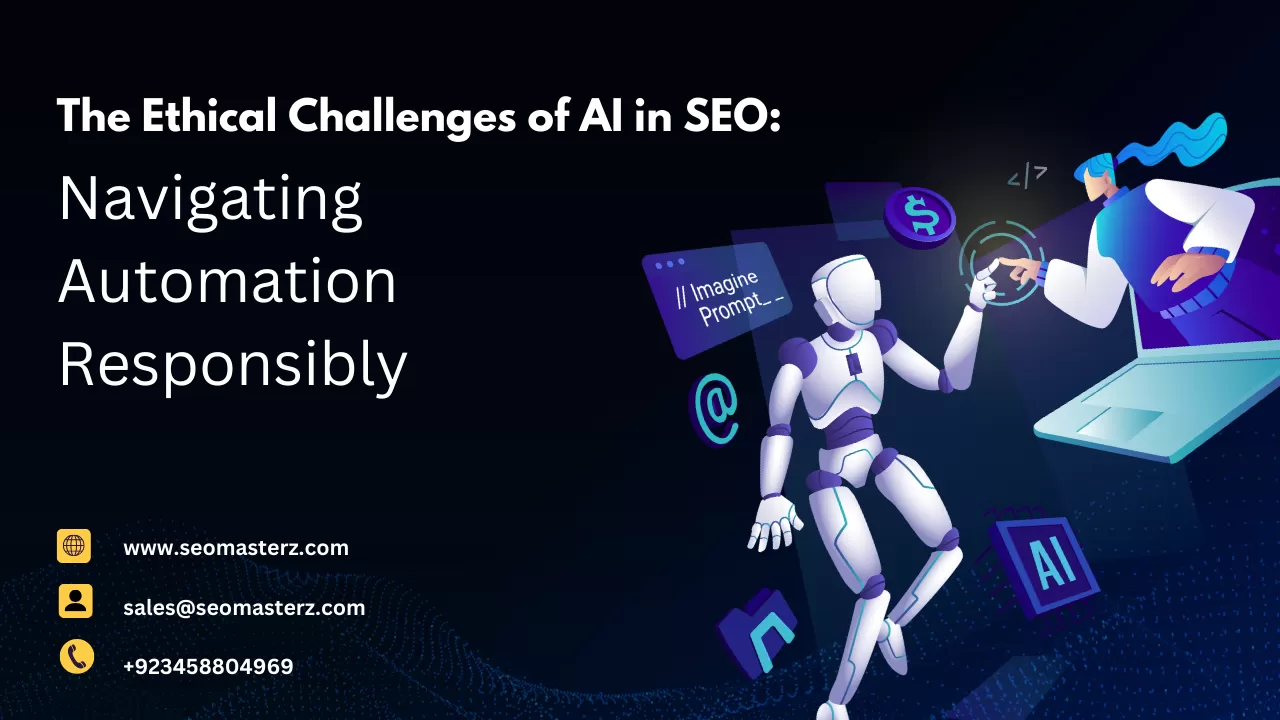Artificial Intelligence AI has undoubtedly revolutionized search engine optimization SEO as automation has become the backbone of digital marketing. Ethical Challenges AI’s ability to analyze large datasets and improve content rankings has raised ethical questions that cannot be ignored.
In this in depth exploration, we will uncover the ethical dilemmas businesses face when implementing AI in SEO, provide actionable solutions, and explore how to strike the right balance between innovation and integrity.

The Rise of AI in SEO
AI has become an indispensable part of the modern SEO workflow. AI tools are used for a variety of tasks, including
Keyword research and optimization: AI can quickly identify high-ranking keywords based on user behavior and search trends.
Content creation AI-powered content tools like the GPT model help create SEO-friendly blog posts, articles, and even product descriptions.
On page optimization AI helps improve the structure, readability, and make content more search engine-friendly.
Predictive analytics AI analyzes past data to predict future SEO trends, helping businesses stay ahead of the curve.
These innovations make SEO operations more efficient, data driven, and scalable. However, the question arises:
what ethical concerns do these developments raise, and how can businesses conduct them responsibly?
Best Practices for Ethical AI SEO
AI has streamlined SEO by making data analysis faster and content optimization easier, however its unchecked application raises concerns about transparency and credibility. While AI offers unparalleled benefits, it also presents ethical questions that impact the digital ecosystem.
Navigating these challenges requires a conscious effort from marketers and businesses to ensure that AI is used responsibly.
Understanding AI in SEO
AI in SEO involves the use of machine learning algorithms, natural language processing (NLP), and automation to improve website visibility and rankings. It enables predictive analytics content creation and real-time optimization, making SEO campaigns more effective.
Common AI powered SEO tools
Content generation platforms Keyword research and analysis tools SERP rank tracking software AI-powered site audits Competitive analysis solutions Ethical challenges of AI in SEO The rapid development of AI has introduced ethical dilemmas that demand careful consideration. From content authenticity to algorithmic bias, there are major challenges here.
Best Practices for Navigating Automation in SEO
Automation in SEO is a game changer, but it works best when combined with human expertise. While tools can streamline keyword research, content optimization, and technical audits, they can’t replace creativity, strategic thinking, or the ability to adapt to algorithm changes. Leave content creation, user intent analysis, and brand storytelling to human judgment, using automation to handle data-heavy tasks like tracking rankings, generating reports, and identifying trends. Balance is key; over-reliance on automation can lead to generic, unimpressive content that lacks a personal touch. Instead, think of automation as an assistant, not a replacement, helping you work smarter while focusing on what really matters engaging, high quality content that resonates with your audience.
Impact on content authenticity
AI can produce content that is grammatically correct and contextually relevant, but it lacks real human insight, raising concerns about low-quality content, misinformation, and a lack of originality.
Consequences
Low credibility
Loss of user trust
Poor engagement rates
Data privacy and transparency concerns
AI systems often rely on vast data sets to make decisions without clear visibility into data usage, users may unknowingly share personal information leading to privacy breaches.
Consequences
Breach of data privacy laws
Loss of customer trust
Legal liabilities

Algorithmic bias and fairness
AI algorithms can unintentionally favor certain content or websites due to biased training data, creating an unfair digital landscape with limited opportunities for small businesses and diverse voices.
Consequences
Unequal representation
Misleading search results
Reduced diversity in digital content.
Manipulation and Black Hat Practices
Some marketers misuse AI to manipulate search algorithms that engage in unethical practices such as keyword stuffing, cloaking, and content scraping.
Consequences
Search engine penalties
Damage to brand reputation
Loss of user trust
Reducing ethical risks in AI-powered SEO
A proactive ethical framework is needed to address these challenges. Here are some actionable steps to maintain integrity while leveraging AI in SEO.
The role of human oversight
AI should not replace human judgment but rather augment decision-making. Human oversight ensures that AI-generated content aligns with brand values and ethical standards.
Best practices for ethical AI SEO Transparency: Clearly disclose AI usage and data policies.
Quality assurance: Prioritize originality and factual accuracy.
Bias Mitigation: Regularly audit AI algorithms for bias.
User Privacy: Ensure compliance with GDPR CCPA and other regulations
Continuous Monitoring: Track AI driven results and adjust strategies accordingly.
Frequently Asked Questions
Why is AI used in SEO?
AI increases efficiency by automating tasks like keyword analysis content optimization and competitive research.
Can AI produce ethical content?
Yes, but it requires human oversight to ensure accuracy, authenticity, and compliance with ethical guidelines.
How can companies prevent algorithmic bias?
Companies can implement diverse training data audits and apply ethical AI frameworks to reduce bias.
What are the consequences of unethical AI SEO practices?
Unethical behavior can damage reputation and lead to loss of user trust due to search engine penalties.
Is AI SEO suitable for small businesses?
Yes, small businesses can leverage AI tools to improve visibility, but they should focus on ethical and transparent practices.
The integration of AI into SEO offers vast opportunities but also comes with ethical responsibilities. Businesses should prioritize transparency and user privacy when implementing AI-powered strategies.
By ensuring quality content while maintaining human oversight and complying with regulations, companies can navigate the ethical challenges of AI in SEO while building long-term reputation and success.
Adopting ethical AI SEO is not just a best practice, it is a commitment to fostering a responsible digital future.
Related Keywords and LSI Keywords
Ethical AI in Digital Marketing
AI Content Moderation
Data Privacy in SEO
Algorithm Transparency
Responsible AI Practices
Machine Learning Ethics in SEO
AI-Powered SEO Tools
Dangers of SEO Automation

